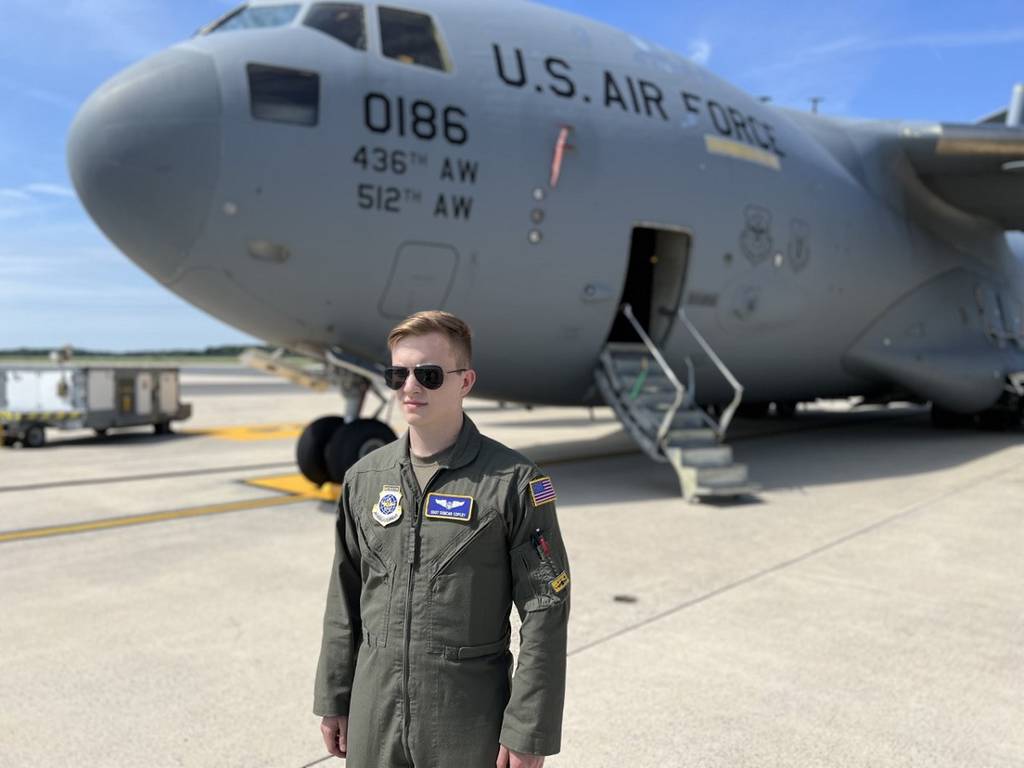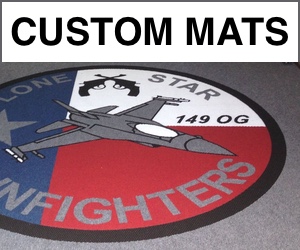Staff Sgt. Duncan Copley is aware of the dangers he runs every time he heads out on a C-17 transport mission. But nearly nothing may have ready him for the message that got here throughout his headset in August 2021:
“We have credible intel that there could be a bomb on board.”
Copley’s calm beneath stress as a loadmaster throughout Operation Allies Refuge, the frantic effort to evacuate greater than 124,000 folks from Afghanistan final summer time, earned him Military Times’ 2022 Airman of the Year award.
RELATED
Copley, 23, of Manitowoc, Wisconsin, is a C-17 Globemaster III loadmaster teacher on the third Airlift Squadron at Dover Air Force Base, Delaware.
He joined the Air Force in December 2017 to observe in the footsteps of his father, a Marine veteran, and different members of the family who served in the armed forces. He initially shied away from working in cargo, however gave it a shot and got here to get pleasure from it.
After a 12 months of technical coaching, Copley moved to Dover, a significant transportation hub for U.S. presidents. He started flying presidential airlift missions through the Trump administration in February 2019, and deployed to Kuwait for about three months that 12 months to maneuver navy personnel across the Middle East.
RELATED
:quality(70)/cloudfront-us-east-1.images.arcpublishing.com/mco/H4UU6CMUNZHDFFFNTTDZ5LBGKM.jpg)
Newly elected President Joe Biden pledged in April 2021 to deliver troops residence inside 5 months, an exit meant to coincide with the 20-year anniversary of the Sept. 11, 2001, terror assaults.
The U.S. launched Operation Allies Refuge in July, a military-led effort to deliver particular immigrant visa holders, candidates and potential candidates who had helped the U.S. push for democracy there to security.
Copley hadn’t been tasked to ferry troops or materiel out of Afghanistan because the withdrawal picked up pace over the summer time. He tracked some developments on social media because the state of affairs grew extra chaotic, however had largely checked out whereas visiting his girlfriend’s household in Wisconsin.
Then he acquired a name that caught him off guard.
“‘When you get back, you’re flying immediately,’” Copley mentioned his supervisor instructed him.
The airman made the 16-hour drive again to Delaware, scrambled to collect what he wanted at residence, and deployed to Al Udeid Air Base in Qatar Aug. 16. He wasn’t positive what lay forward.
“Being told about this mass-scale evacuation, I didn’t know what to think,” Copley mentioned. “We’re going [to U.S. Central Command] so often that the risks become normal.”
RELATED
:quality(70)/cloudfront-us-east-1.images.arcpublishing.com/mco/VA7AZKZCCJEZPHR37PLXLKEIHU.jpg)
After taking a number of days to settle into Al Udeid, Copley obtained his first project to Kabul. Neither he nor the aeromedical crew boarding the identical jet have been clear on what the mission would entail.
When his C-17 touched down at Kabul’s Hamid Karzai International Airport, Copley was pleasantly shocked that the U.S. navy had gained management of the airfield — in stark distinction with the mobbed runway that had gone viral on social media earlier that month.
They picked up 4 Afghans in want of medical consideration, together with a person in vital situation. About 250 extra folks joined them.
One translator who occurred to be on the flight stood out, working with the Americans and ensuring the passengers understood what was taking place.
“We need this guy to work for us,” Copley joked to different airmen in Qatar.
He bumped into the translator quickly after on a flight from Al Udeid to Ramstein Air Base in Germany.
“I thought that was awesome — I saw firsthand something that I did,” Copley mentioned. “I brought him back, and then we got him moved into the system and he was out there helping us make sure the whole airlift went efficiently.”
For the primary two flights into Kabul, loading passengers onto the aircraft felt nearly like enterprise as common.
“All the gears are turning, every agency was working well together to make sure that people were coming out to the aircraft. It felt pretty normal,” Copley mentioned.
Their third and closing mission started the identical method.
It was Aug. 28, two days after an Islamic State militant blew himself up on the airport’s Abbey Gate entrance, killing at the very least 170 Afghan civilians and 13 American service members.
The assault put Copley on edge. Before leaving on his final mission to Kabul, he texted the 2 folks closest to him who may perceive his concern: his father, the Marine vet, and his girlfriend, a Wisconsin Army National Guardsman who works in area artillery.
His dad texted again “the most Marine Corps thing,” Copley mentioned: “Go do your job. Go do it well. I’ll see you when you get home.”
RELATED
:quality(70)/cloudfront-us-east-1.images.arcpublishing.com/mco/YWW7ZFIF5JB3LG4JVVMDYZJEJE.jpg)
Copley was instructed they’d obtain round 235 refugees that day and introduced them in as common. The airmen counted about 10 extra passengers than anticipated, and reported it to air site visitors management forward of takeoff.
Air site visitors management instructed them to attend; a number of minutes handed.
RELATED
:quality(70)/cloudfront-us-east-1.images.arcpublishing.com/mco/W4URJO2VEVA2BLEF6KKT2WEM6E.jpg)
Then the radio crackled to life, warning that the U.S. had intercepted a telephone name a couple of bombing try. No one spoke. Copley nervously chuckled.
“We need you to listen closely. Do exactly as we say. Do not let anybody know that we know that there is a possible threat,” he recalled the management tower saying.
Copley had the nerve-wracking job of saying to the Afghans that they wanted to deplane so Marines may seek for explosives.
Some passengers balked — the C-17 was their lifeline overseas — however finally complied. The Marines checked every individual and their luggage, performed a safety sweep of the jet and cleared it to depart.
RELATED
:quality(70)/cloudfront-us-east-1.images.arcpublishing.com/mco/RIUX3SLEE5AQ3HIIXEQRASTX54.jpg)
Copley and his crew had already labored longer than 24 hours straight when their plane lastly acquired the all-clear to depart, and blew previous their 26-hour shift restrict whereas in the air again to Qatar.
He arrived at Al Udeid rattled, however secure. He’s undecided what turned of the alleged bomb, if it existed in any respect.
“While I’m doing my job … I don’t have time to think about the ‘what ifs,’” he mentioned. “When we were told that there was a credible threat on board, I didn’t get to have an opinion. I didn’t let myself.”
Pentagon spokesman John Kirby instructed reporters after the Abbey Gate assault that U.S. officers believed the airport nonetheless confronted “specific, credible” threats.
Capt. Taylor Drolshagen, who flies the EC-130H Compass Call digital assault aircraft, instructed Air Force Times in February that “many Americans are alive today who wouldn’t be” if Compass Call crews hadn’t monitored the Kabul airport from above.
She declined to reply whether or not an EC-130H had remotely stopped a bomb from detonating onboard the transport jet, as it could possibly for improvised explosive gadgets planted on the bottom.
“My guys were directly involved with saving lives both on the ground and also in the C-17s,” Drolshagen mentioned.
RELATED
:quality(70)/cloudfront-us-east-1.images.arcpublishing.com/mco/C5BOBBDWPRGR7FQU24A7VJU5XE.jpg)
In the months that adopted, Copley struggled to course of his feelings. He’s fought off impostor syndrome, whispering that his trauma isn’t legitimate as a result of a bomb by no means went off.
“I could have died that day,” he mentioned. “It could have happened and I can accept that.”
Fonder moments stay, too. Copley made positive his passengers have been cared for, refusing to depart till they’d sufficient water on board to make it through a flight. On one journey, he befriended a number of younger Afghan boys and, pulling out his Nintendo Switch, provided to race them in Mario Kart. It was all enjoyable and video games till Copley began dropping.
The expertise proved that he’s able to being a part of one thing large, and has inspired him to reenlist, he mentioned.
Copley resumed extra typical airlift missions after the withdrawal, shifting cargo across the U.S. and to Germany and Spain. He’s taken half in transport missions in help of NATO and Ukraine throughout Russia’s ongoing invasion of its neighbor, however is presently grounded whereas present process bodily remedy for a shoulder harm.
When not pushing pallets onto planes, the workers sergeant racks up about 80 hours of volunteering annually. He’s run retirement ceremonies, deliberate a Holocaust remembrance occasion and a squadron vacation get together, and created alternatives for airmen to bond through the pandemic, in response to his award nomination package deal.
Copley thinks he may make it to twenty years in uniform. He’d like to go to Altus Air Force Base, Oklahoma, for formal C-17 teacher coaching, then return to a flying squadron for a number of years, pursue a workers job at Air Mobility Command headquarters in Illinois for extra stability whereas he begins a household, and end out his profession at one other flying squadron.
“I’ve learned a lot about myself,” he mentioned of his first few years in the service. “I’ve definitely been molded into a leader.”
Rachel Cohen joined Air Force Times as senior reporter in March 2021. Her work has appeared in Air Force Magazine, Inside Defense, Inside Health Policy, the Frederick News-Post (Md.), the Washington Post, and others.





